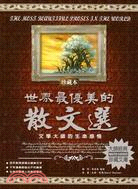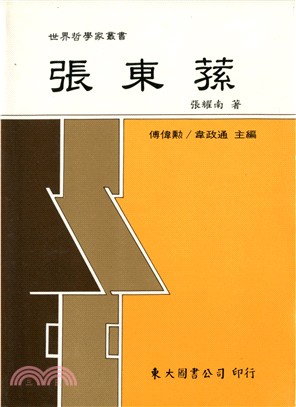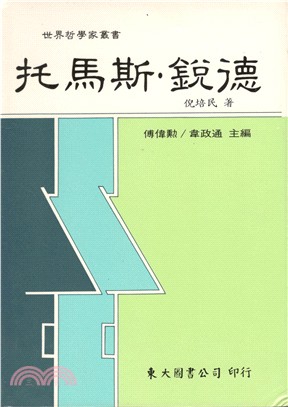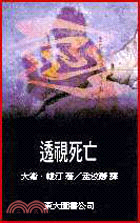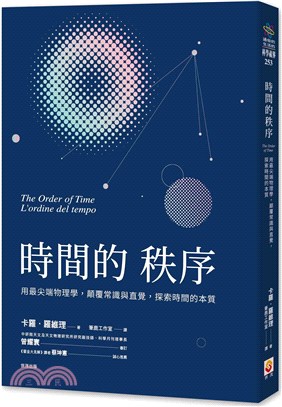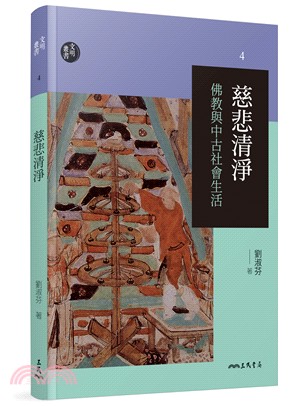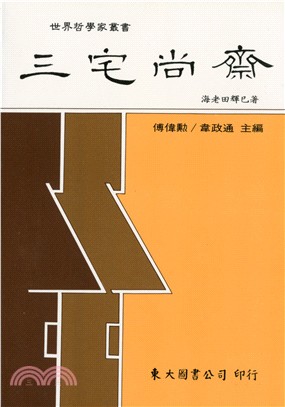定價
:NT$ 280 元優惠價
:90 折 252 元
領券後再享89折起
領
團購優惠券A
8本以上且滿1500元
再享89折,單本省下28元
再享89折,單本省下28元
領
無庫存,下單後進貨(採購期約4~10個工作天)
可得紅利積點:7 點
相關商品
商品簡介
作者簡介
序
目次
書摘/試閱
商品簡介
一本關於「真」的書:一篇散文,百種人生感悟,其中蘊涵了大師們對自然的感悟、體驗生死的情愫,生命如同四季一樣花開花落,然而其中的真理將銘刻在這些篇章中。
一本關於「善」的書:閱讀本書,流連於名家名作中,體會親人的愛和朋友的關懷,一種向善的力量,將使乾涸的心靈得以滋潤,枯萎的生命得以激勵。
一本關於「美」的書:共賞雋永的不朽作品,藉由名家筆觸感受唯美。翻開本書的一瞬間,將成為你生命的一部分,享受閱讀之樂、感知之樂、人生之樂。
一本關於「英美文學」的書:本書所選文章篇篇膾炙人口,堪稱人類語言文字之傑作。全書採取中英對照之原文韻味,讀者可以一邊欣賞文字之美,一邊學習英文的詞彙語法,使自己的英文能力得以提高。
一本關於「善」的書:閱讀本書,流連於名家名作中,體會親人的愛和朋友的關懷,一種向善的力量,將使乾涸的心靈得以滋潤,枯萎的生命得以激勵。
一本關於「美」的書:共賞雋永的不朽作品,藉由名家筆觸感受唯美。翻開本書的一瞬間,將成為你生命的一部分,享受閱讀之樂、感知之樂、人生之樂。
一本關於「英美文學」的書:本書所選文章篇篇膾炙人口,堪稱人類語言文字之傑作。全書採取中英對照之原文韻味,讀者可以一邊欣賞文字之美,一邊學習英文的詞彙語法,使自己的英文能力得以提高。
作者簡介
大衛.梭羅(David Thoreau)
美國詩人、散文作家、哲學家,出生於美國康科德(西元1817~1862),一生最著名的創作為《湖濱散記》和《瓦爾登湖》。他一生未娶,曾在瓦爾登湖畔隱居,度過二年有餘依靠自給自足、脫離世俗、離群索居的與世隔絕生活,因而寫下了著名的《湖濱散記》一書,舉世公認最令人難忘的一部心靈經典。他鼓勵人們簡化生活,品味人生,多利用時間探討生命的真諦,其思想對當時的美國社會影響很大。
譯者簡介
徐漢林
畢業於國立師範大學英文系,曾當過教授,對英文研究造詣頗深,喜好歐美文學讀物,尤其對於名人著作更是學有專攻、卓然有成,並不遺餘力地進行推廣,翻譯作品經常發表於各大報章雜誌,是一位優秀的翻譯家。
美國詩人、散文作家、哲學家,出生於美國康科德(西元1817~1862),一生最著名的創作為《湖濱散記》和《瓦爾登湖》。他一生未娶,曾在瓦爾登湖畔隱居,度過二年有餘依靠自給自足、脫離世俗、離群索居的與世隔絕生活,因而寫下了著名的《湖濱散記》一書,舉世公認最令人難忘的一部心靈經典。他鼓勵人們簡化生活,品味人生,多利用時間探討生命的真諦,其思想對當時的美國社會影響很大。
譯者簡介
徐漢林
畢業於國立師範大學英文系,曾當過教授,對英文研究造詣頗深,喜好歐美文學讀物,尤其對於名人著作更是學有專攻、卓然有成,並不遺餘力地進行推廣,翻譯作品經常發表於各大報章雜誌,是一位優秀的翻譯家。
序
微風緩緩地吹著百葉窗,吹在窗上,非常溫柔,
像羽毛似的;偶爾也會猶如幾聲嘆息,
聽起來向夏日漫漫長夜裡的風輕撫著樹葉的聲音。
在鋪著草皮的地下,田鼠正在地洞裡呼呼大睡,
貓頭鷹則在沼澤地深處的一棵空心樹裡蹲著,
兔子、松鼠、狐狸都待在家裡。
寫在前面《世界上最優美的散文選》
讀一篇優美的散文,如品一杯茗茶,馨香繞杯,久久不忘;讀一本好書,如與偉人對話,智慧之光映射身心。
本書精選了60多篇世界上最具代表性的散文,所選篇目接出自於名家,言語優美,意義深邃,堪稱人類文明的共同財富。同時本書的內容廣泛,包羅自然、社會、人生等方方面面。為了便於讀者的閱讀,書中配有許多契合散文內容的圖片,帶來視覺享受的同時,也擴大其想像空間,引導讀者以不同角度去品味散文的主旨、意義和意蘊。
本書既是文學愛好者、英語學習愛好者的必備讀物,也是忙碌現代人的一片憩息心靈的家園。
像羽毛似的;偶爾也會猶如幾聲嘆息,
聽起來向夏日漫漫長夜裡的風輕撫著樹葉的聲音。
在鋪著草皮的地下,田鼠正在地洞裡呼呼大睡,
貓頭鷹則在沼澤地深處的一棵空心樹裡蹲著,
兔子、松鼠、狐狸都待在家裡。
寫在前面《世界上最優美的散文選》
讀一篇優美的散文,如品一杯茗茶,馨香繞杯,久久不忘;讀一本好書,如與偉人對話,智慧之光映射身心。
本書精選了60多篇世界上最具代表性的散文,所選篇目接出自於名家,言語優美,意義深邃,堪稱人類文明的共同財富。同時本書的內容廣泛,包羅自然、社會、人生等方方面面。為了便於讀者的閱讀,書中配有許多契合散文內容的圖片,帶來視覺享受的同時,也擴大其想像空間,引導讀者以不同角度去品味散文的主旨、意義和意蘊。
本書既是文學愛好者、英語學習愛好者的必備讀物,也是忙碌現代人的一片憩息心靈的家園。
目次
第一卷 生命中的陽光
1青春 【德國】塞繆爾.烏爾曼 10
Youth Sammel Ullman
2快樂吧! 【英國】勞埃德.莫里斯 12
Be Happy! Lloyd Morris
3快樂谷 【英國】塞謬爾.約翰遜 14
The Happy Valley Samuel Johnson
4生命 【美國】沃爾多.愛默生 16
Life Waldo Emerson
5論美 【美國】沃爾多.愛默生 18
Beauty Waldo Emerson
6圓 【美國】沃爾多.愛默生 27
Circles Waldo Emerson
7陽光下的時光 【美國】約翰.布萊德利 33
Hour in the Sun John H.Bradley
8熱愛生活 【美國】大衛.梭羅 35
Love Your Life David Thoreau
9我的母親 【美國】馬克.吐溫 37
This was My Mother Mark Twain
10艱辛的人生 【美國】西奧多.羅斯福 39
The Strenuous Life Theodore Roosevelt
11真實的高貴 【美國】歐納斯特.海明威 41
True Nobility Ernest Hemingway
12愛是艱難的 【奧地利】馬利亞.里爾克 43
Love is Difficult Rainer Maria Rilke
13愛 【黎巴嫩】卡里.紀伯倫 45
On Love Kahlil Gibran
14孩子 【黎巴嫩】卡里.紀伯倫 49
On Children Kahlil Gibran
15友誼 【黎巴嫩】卡里.紀伯倫 51
On Friendship Kahlil Gibran
16我愛人人,人人愛我 【馬其頓】德雷莎修女 53
To Love and to Be Loved Mother Teresa
第二卷 人在旅途
1與書為伴 【蘇格蘭】塞繆爾.斯邁爾斯 56
Companionship of Books Samuel Smiles
2談怕死 【英國】威廉.哈茲里特 58
On the Fear of Death William Hazlitt
3談膽量 【英國】佛蘭西斯.培根 60
Of Boldness Francis Bacon
4論出遊 【英國】威廉.哈茲里特 64
On Going a Journey William Hazlitt
5黃金國 【英國】路易斯.史蒂文森 75
El Dorado Louis Stevenson
6我的人生已逝 【英國】喬治.吉辛 80
My Life is Over George Gissing
7人的指導者 【英國】史賓塞.邱吉爾 82
Man’s Guide Spencer Churchill
8人類的故事 【英國】史賓塞.邱吉爾 84
The Human Story Spencer Churchill
9西敏大寺 【美國】華盛頓.歐文 86
Westminster Abbey Washington Irving
10我們在旅途中 【美國】亨利.戴克 99
We are on a Journey Henry Dyke
11人類的精神 【美國】威廉.福克納 101
The Spirit of Man William Faulkner
12再度遊湖 【美國】布魯克斯.懷特 103
Once More to the Lake Brooks White
13勇氣 【美國】約翰.甘迺迪 114
Courage John Kennedy
14婚姻 【黎巴嫩】卡里.紀伯倫 116
On Marriage Kahlil Gibran
第三卷 冬日漫步
1論青年與老年 【英國】佛蘭西斯.培根 120
Of Youth and Age Francis Bacon
2論自私者的聰明 【英國】弗朗西斯.培根 122
Of Wisdom for a Man’s Self Francis Bacon
3論懶散 【英國】塞繆爾.約翰遜 125
On Idleness Samuel Johnson
4古瓷器 【英國】查爾斯.蘭姆 130
Old China Charles Lamb
5送行 【英國】麥克斯.畢爾勃姆 137
Seeing People Off Max Beerbohm
6美腿與醜腿 【美國】班傑明.富蘭克林 145
The Handsome and Deformed Leg Benjamin Franklin
7冬日漫步 【美國】大衛.梭羅 149
A Winter Walk David Thoreau
8《寬容》序言 【美國】威廉.房龍 161
Prologue Tolerance Willem Van Loon
9《新月集》選摘 【印度】拉賓德拉納特.泰戈爾 171
The Crescent Moon Rabindranath Tagore
第四卷 四季尋幽
1如果我休息,我就生鏽 【美國】奧里森.馬登 178
If I Rest, I Rust Orison Marden
2河谷尋幽 【英國】威廉.科貝特 180
Down the Valley William Cobbett
3八月 【英國】查爾斯.狄更斯 186
August Charles Dickens
4玫瑰 【美國】洛根.皮爾索爾.史密斯 188
The Rose Logan Pearsall Smith
5霧 【英國】喬治.斯特里特 193
Fog George Street
6初雪 【英國】約翰.普里斯特利 197
First Snow John Priestley
7蜉蝣 【美國】班傑明.富蘭克林 203
The Ephemera Benjamin Franklin
8英國的農村生活 【美國】華盛頓.歐文 207
Rural Life in England Washington Irving
9人與自然 【美國】漢密爾頓.馬堡 209
Man and Nature Hamilton Mabie
10晚夏 【美國】歐內斯特.海明威 211
Late Summer Ernest Hemingway
11一個完全相反的地方 【法國】阿爾伯特.卡繆 213
A Thoroughly Negative Place Albert Camus
第五卷 寧靜的心
1論讀書 【英國】佛蘭西斯.培根 218
Of Studies Francis Bacon
2論人間榮譽之虛渺 【英國】丹尼爾.狄福 221
On the Instability of Human Glory Daniel Defoe
3常識 【英國】托馬斯.潘恩 223
Common Sense Thomas Paine
4買書 【英國】奧古斯丁.比勒爾 229
Book-Buying Augustine Birrell
5微塵與棟樑 【英國】威廉.毛姆 236
On Motes and Beams William Maugham
6寫作的樂趣 【英國】史賓塞.邱吉爾 238
The Joys of Writing Spencer Churchill
7作者自述 【美國】華盛頓.歐文 244
The Author’s Account of Himself Washington Irving
8孤獨 【美國】大衛.梭羅 249
Solitude David Thoreau
9假如給我三天光明 【美國】海倫.凱勒 255
Three Days to See Helen Keller
10中庸之道 【西班牙】巴爾塔沙.葛拉西安 273
The Golden Mean Balthasar Gracian
11論寧靜的心 【猶太】約書亞.李普曼 275
On Peace of Mind Joshua Liebman
12貝婷.布倫塔諾致歌德 【德國】貝婷.布倫塔諾 277
Bettina Brentano to Goethe Bettina Brentano
1青春 【德國】塞繆爾.烏爾曼 10
Youth Sammel Ullman
2快樂吧! 【英國】勞埃德.莫里斯 12
Be Happy! Lloyd Morris
3快樂谷 【英國】塞謬爾.約翰遜 14
The Happy Valley Samuel Johnson
4生命 【美國】沃爾多.愛默生 16
Life Waldo Emerson
5論美 【美國】沃爾多.愛默生 18
Beauty Waldo Emerson
6圓 【美國】沃爾多.愛默生 27
Circles Waldo Emerson
7陽光下的時光 【美國】約翰.布萊德利 33
Hour in the Sun John H.Bradley
8熱愛生活 【美國】大衛.梭羅 35
Love Your Life David Thoreau
9我的母親 【美國】馬克.吐溫 37
This was My Mother Mark Twain
10艱辛的人生 【美國】西奧多.羅斯福 39
The Strenuous Life Theodore Roosevelt
11真實的高貴 【美國】歐納斯特.海明威 41
True Nobility Ernest Hemingway
12愛是艱難的 【奧地利】馬利亞.里爾克 43
Love is Difficult Rainer Maria Rilke
13愛 【黎巴嫩】卡里.紀伯倫 45
On Love Kahlil Gibran
14孩子 【黎巴嫩】卡里.紀伯倫 49
On Children Kahlil Gibran
15友誼 【黎巴嫩】卡里.紀伯倫 51
On Friendship Kahlil Gibran
16我愛人人,人人愛我 【馬其頓】德雷莎修女 53
To Love and to Be Loved Mother Teresa
第二卷 人在旅途
1與書為伴 【蘇格蘭】塞繆爾.斯邁爾斯 56
Companionship of Books Samuel Smiles
2談怕死 【英國】威廉.哈茲里特 58
On the Fear of Death William Hazlitt
3談膽量 【英國】佛蘭西斯.培根 60
Of Boldness Francis Bacon
4論出遊 【英國】威廉.哈茲里特 64
On Going a Journey William Hazlitt
5黃金國 【英國】路易斯.史蒂文森 75
El Dorado Louis Stevenson
6我的人生已逝 【英國】喬治.吉辛 80
My Life is Over George Gissing
7人的指導者 【英國】史賓塞.邱吉爾 82
Man’s Guide Spencer Churchill
8人類的故事 【英國】史賓塞.邱吉爾 84
The Human Story Spencer Churchill
9西敏大寺 【美國】華盛頓.歐文 86
Westminster Abbey Washington Irving
10我們在旅途中 【美國】亨利.戴克 99
We are on a Journey Henry Dyke
11人類的精神 【美國】威廉.福克納 101
The Spirit of Man William Faulkner
12再度遊湖 【美國】布魯克斯.懷特 103
Once More to the Lake Brooks White
13勇氣 【美國】約翰.甘迺迪 114
Courage John Kennedy
14婚姻 【黎巴嫩】卡里.紀伯倫 116
On Marriage Kahlil Gibran
第三卷 冬日漫步
1論青年與老年 【英國】佛蘭西斯.培根 120
Of Youth and Age Francis Bacon
2論自私者的聰明 【英國】弗朗西斯.培根 122
Of Wisdom for a Man’s Self Francis Bacon
3論懶散 【英國】塞繆爾.約翰遜 125
On Idleness Samuel Johnson
4古瓷器 【英國】查爾斯.蘭姆 130
Old China Charles Lamb
5送行 【英國】麥克斯.畢爾勃姆 137
Seeing People Off Max Beerbohm
6美腿與醜腿 【美國】班傑明.富蘭克林 145
The Handsome and Deformed Leg Benjamin Franklin
7冬日漫步 【美國】大衛.梭羅 149
A Winter Walk David Thoreau
8《寬容》序言 【美國】威廉.房龍 161
Prologue Tolerance Willem Van Loon
9《新月集》選摘 【印度】拉賓德拉納特.泰戈爾 171
The Crescent Moon Rabindranath Tagore
第四卷 四季尋幽
1如果我休息,我就生鏽 【美國】奧里森.馬登 178
If I Rest, I Rust Orison Marden
2河谷尋幽 【英國】威廉.科貝特 180
Down the Valley William Cobbett
3八月 【英國】查爾斯.狄更斯 186
August Charles Dickens
4玫瑰 【美國】洛根.皮爾索爾.史密斯 188
The Rose Logan Pearsall Smith
5霧 【英國】喬治.斯特里特 193
Fog George Street
6初雪 【英國】約翰.普里斯特利 197
First Snow John Priestley
7蜉蝣 【美國】班傑明.富蘭克林 203
The Ephemera Benjamin Franklin
8英國的農村生活 【美國】華盛頓.歐文 207
Rural Life in England Washington Irving
9人與自然 【美國】漢密爾頓.馬堡 209
Man and Nature Hamilton Mabie
10晚夏 【美國】歐內斯特.海明威 211
Late Summer Ernest Hemingway
11一個完全相反的地方 【法國】阿爾伯特.卡繆 213
A Thoroughly Negative Place Albert Camus
第五卷 寧靜的心
1論讀書 【英國】佛蘭西斯.培根 218
Of Studies Francis Bacon
2論人間榮譽之虛渺 【英國】丹尼爾.狄福 221
On the Instability of Human Glory Daniel Defoe
3常識 【英國】托馬斯.潘恩 223
Common Sense Thomas Paine
4買書 【英國】奧古斯丁.比勒爾 229
Book-Buying Augustine Birrell
5微塵與棟樑 【英國】威廉.毛姆 236
On Motes and Beams William Maugham
6寫作的樂趣 【英國】史賓塞.邱吉爾 238
The Joys of Writing Spencer Churchill
7作者自述 【美國】華盛頓.歐文 244
The Author’s Account of Himself Washington Irving
8孤獨 【美國】大衛.梭羅 249
Solitude David Thoreau
9假如給我三天光明 【美國】海倫.凱勒 255
Three Days to See Helen Keller
10中庸之道 【西班牙】巴爾塔沙.葛拉西安 273
The Golden Mean Balthasar Gracian
11論寧靜的心 【猶太】約書亞.李普曼 275
On Peace of Mind Joshua Liebman
12貝婷.布倫塔諾致歌德 【德國】貝婷.布倫塔諾 277
Bettina Brentano to Goethe Bettina Brentano
書摘/試閱
第一卷 生命中的陽光
August has no such advantage. It comes when we remember nothing but clear skies, green fields, and sweet-smelling flowers-when the recollection of snow, and ice, and bleak winds, has faded from our minds as completely as they have disappeared from the earth- and yet what a pleasat time it is!
八月就沒有這樣的優勢。它來的時候,我們只記得 明朗的天空,綠綠的田野,還有芳香四溢的花朵CD記憶中 的冰雪、寒風都已完全消失,彷彿它們在地球上 了無蹤跡CD然而八月是多麼愉快的季節啊!
1青 春
作者介紹
塞繆爾.烏爾曼(1840-1920),猶太人,出生於德國,1851年隨家人移民到美國密西西比。烏爾曼雖以教育家和社會活動家而聞名於世,但在文學創作方面非常有才華。他的《青春》一文,因為麥克阿瑟將軍的推崇而廣為傳頌。
青春不是年華,而是一種心態;不是玫瑰般的臉龐,紅潤的嘴唇和敏捷的雙腿,而是堅韌的意志,豐富的想像力,以及無窮的激情;青春是生命深處的一股清泉。
青春意味著勇氣多於怯懦,青春意味著喜歡冒險而討厭安逸。擁有此種特質的人之中,六十歲的老人往往多於二十歲的年輕人。沒有人只因年齡的增長而年老,人們往往因放棄理想而年老。
歲月可使肌膚長滿皺紋,但放棄激情可使心靈佈滿灰塵。焦慮、疑惑、猜疑、恐懼和沮喪CD都會挫傷心靈,磨損意志。
不管是白髮老人還是青春少年,每個人的心裏皆有其喜歡之新奇事物,對星星和類似星星的東西皆有好奇之心,敢於挑戰,對未知事物的孩子般的渴求之心,樂於享受生活帶來的樂趣。
我們因充滿信心而變得年輕;因心存疑慮而變得年老;因自信而年輕,因心存恐懼而年老;因充滿希望而年輕,因滿懷沮喪而年老。
人人心裏都有一座無線電臺,只要接收到來自地球、人類和宇宙的美好、希望、勇氣、莊嚴及力量,就會變得年輕。
當心靈的天線倒下,心如大雪般的悲觀、如冰塊般的憤世嫉俗時,那時,唯有那時,我們將真正老去。
Youth
Samuel Ullman
Youth is not entirely a time of life; it is a state of mind; it is not a matter of rosy cheeks, red lips and supple knees; it is a temper of the will, a quality of the imagination, a vigor of the emotions; it is the freshness of the deep springs of life.
Youth means the temperamental predominance of courage over timidity, of the appetite of adventure over the love of ease. This often exists in a man of sixty more than in a boy of twenty. Nobody grows old by merely living a number of years. We grow old by deserting our ideals.
Years may wrinkle the skin, but to give up enthusiasm wrinkles the soul. Worry, doubt, self-distrust, fear and despairCDthese bow the heart and turn the spirit back to dust.
Whether sixty or sixteen, there is in every human being’s heart the love of wonder, the sweet amazement at the stars and the star like things, the undaunted challenge of events, the unfailing child-like appetite for what-next, and the joy of the game of living.
You are as young as your faith, as old as your doubt; as young as your self-confidence, as old as your fear; as young as your hope, as old as your despair.
In the central place of your heart there is a wireless station, so long as it receives message of beauty, hope, courage, grandeur and power from the earth, from man and from the Infinite, so long are you young.
When the wires are all down, and all the central places of your heart are covered with the snows of pessimism and the ice of cynicism, then, and only then, are you grown old indeed.
2快樂吧!
作者介紹
勞埃德.莫里斯(1613-1680),英國作家,作品富於機智幽默。著有《格言集》等。
本文以演繹的手法論述快樂對人的影響。作者先藉梅斯菲爾德的詩引出「快樂」與「智慧」的關係,接著以人在快樂時的種種心理反應,點出快樂無處不在。最後再給予肯定的結論:快樂是智慧的開端。
「快樂的日子,使我們聰明。」
CD約翰.梅斯菲爾德
一次讀到英國桂冠詩人梅斯菲爾德這行詩的時候,我非常驚訝,它真正的寓意是什麼呢?不仔細考慮的話,我一直認為這句詩倒過來才對。不過他的冷靜與自信卻俘獲了我,所以我一直無法忘記這句詩。
終於,我好像領會了他的意思,意識到其中蘊含著深刻的觀察思考。快樂帶來的智慧存在於清晰的心靈感覺中,不因憂慮擔心而困惑,不因絕望、厭煩而遲鈍,不因惶恐而出現盲點。
跳動的快樂CD不僅是滿足或愜意CD會突然到來,就像四月的春雨或是花蕾的綻放。然後你發覺智慧已隨快樂而來。草兒更綠,鳥兒的歌聲更加美妙,朋友的缺點也變得更加可以理解、原諒。快樂就像一副眼鏡,可以修正你精神的視力。
快樂的視野並不受你周圍事物的局限。只不過當你不快樂的時候,思想便轉向你感情上的苦惱,眼界也就被心靈之牆隔斷了。而當你快樂的時候,這道牆便崩塌了。
你的眼界更寬了。腳下的大地,身旁的世界CD人們、思想、情感、壓力CD現在都溶進了一個更加宏偉的情境中,每件事都恰如其分。這就是智慧的開端。
Be Happy!
Lloyd Morris
he days that make us happy make us wise.?
CDJohn Masefield
When I first read this line by England’s Poet Laureate, it startled me. What did Masefield mean? Without thinking about it much, I had always assumed that the opposite was true. But his sober assurance was arresting. I could not forget it.
Finally, I seemed to grasp his meaning and realized that here was a profound observation. The wisdom that happiness makes possible lies in clear perception, not fogged by anxiety nor dimmed by despair and boredom, and without the blind spots caused by fear.
Active happiness not mere satisfaction or contentmentCDoften comes suddenly, like an April shower or the unfolding of a bud. Then you discover what kind of wisdom has accompanied it. The grass is greener, bird songs are sweeter, the shortcomings of your friends are more understandable and more forgivable. Happiness is like a pair of eyeglasses correcting your spiritual vision.
Nor are the insights of happiness limited to what is near around you.Unhappy, with your thoughts turned in upon your emotional woes, your vision is cut short as though by a wall. Happy, the wall crumbles.
The long vista is there for the seeing. The ground at your feet,the world about you
CDpeople, thoughts, emotions, pressuresCDare now fitted into the larger scene. Everything assumes a fairer proportion. And here is the beginning of wisdom.
3快樂谷
作者介紹
塞繆爾.約翰遜(1709-1784),英國詞典編纂家、散文家和文學評論家。一生窮困潦倒,直到歷時九載編纂完成《英語詞典》,才聲名大振。他才學廣博,言談睿智。詩歌代表作《人類欲望的虛妄》反映了他對人生的獨到見解,傳記《英國詩人傳》堅持以事實作傳,把英語傳記文學推向更高的水準。
他說:「人和其他動物的區別在哪裡?在我身旁遊走的每個野獸,和我一樣都有肉體上的需要:餓了吃草,渴了喝溪水,充饑解渴後將滿足地睡去;醒來又餓了,再吃飽休息。我和牠一樣也會饑渴,但不渴也不餓時,我不休息;我也像牠一樣因需求匱乏而痛苦,但不像牠因需求豐裕而滿足。中間這個階段,冗長而又乏味;我又開始渴望饑餓,好再次加速自己的注意。鳥兒啄食著漿果或穀物,好像非常快樂地飛到樹叢中,停靠在樹枝上並且百無聊賴地吟唱著一成不變的曲調。同樣地,我也能叫來琵琶手和歌手,但昨天還能使我愉悅的樂章,今天卻令我厭煩,明天變得更令人厭倦。我從自身發現,沒有一種感受力不是被適度愉悅充滿的,但是我不覺得自己快樂。確實,人類有某種潛在的感覺,會告知自己這個地方不能令人愉悅,或者,在快樂之前,他有一些有別於感覺的渴望,必須先得到滿足。」
The Happy Valley
Samuel Johnson
”What,” said he, ”makes the difference between man and all the rest of the animal creation? Every beast that strays beside me has the same corporal necessities with myself, he is hungry, and crops the grass, he is thirsty, and drinks the stream, his thirst and hunger are appeased, he is satisfied and sleeps; he rises again and he is hungry, he is again fed and is at rest. I am hungry and thirsty like him, but when thirst and hunger cease I am not at rest;I am, like him, pained with want, but am not, like him, satisfied with fullness. The intermediate hours are tedious and gloomy; I long again to be hungry that I may again quicken my attention. The birds peck the berries or the corn, and fly away to the groves where they sit in seeming happiness on the branches, and waste their lives in tuning one unvaried series of sounds. I likewise can call the lutanist and the singer, but the sounds that pleased me yesterday weary me today, and will grow yet more wearisome tomorrow. I can discover within me no power of perception which is not glutted with its proper pleasure, yet I do not feel myself delighted. Man has surely some latent sense for which this place affords no gratification, or he has some desires distinct from sense which must be satisfied before he can be happy.”
4生 命
作者介紹
沃爾多.愛默生(1803-1882),美國思想家、詩人、散文家。生於波士頓牧師家庭,畢業於波士頓拉丁學校和哈佛大學。21歲時成為神職人員,不久便對基督教產生懷疑,1832年辭職遠遊,遍訪歐洲文化名人。曾經深入研究過荷馬、柏拉圖、但丁、蒙田和莎士比亞。代表作有《論自然》、《美國學者》、《神學院致辭》、《散文選》、《詩集》等。
生命可以被想像,但是不能被割裂,也不能被複製。生命的整體一旦被破壞就會引起混亂。靈魂不是孿生兒,而是獨生苗。雖然它早晚都要像嬰兒那樣被孕育成熟,長得也像嬰兒,卻有著一種無敵的力量能決定命運,不會接受同一個生命。生命有著一種唯我獨尊的神聖,這種神聖無須掩蓋,每一天都顯露在人們的舉手投足之中。我們對自己深信不疑,同時去懷疑他人。我們可以讓自己為所欲為,但同樣的事,別人做,我們稱之為罪孽;我們只要自己來實驗。我們充滿自信的一個例子就是:人們從來不像他們想像的那樣蔑視罪惡。換句話說,人人都為自己想好一個不受約束的自由,而這個自由是不能讓別人來享用的。
行為從內在和外表,從性質和後果去看,各為不同。兇手行兇時所抱的意圖絕不像詩人以及傳奇作家所描述的那樣傷天害理,通常人們也覺察不出他心神不寧或誠惶誠恐的蛛絲馬跡。行兇一事並不難謀劃,但去考慮後果的話,它卻能愈演愈烈,發出一系列叮噹作響的恐怖聲,把一切的關聯都破壞。尤其是愛情所激發的罪行,從施罪者的角度看,似乎一切都理所當然,但這罪畢竟貽害社會。然而,還是沒有人會最終相信犯罪的人是迷失了自我,還是沒有人會認為那罪行如同重罪犯的所為那麼惡不可赦。這是因為,就我們自身的情形而言,智力修正著道義判斷,在智力的眼中,世上萬事並無罪過。智力是反律法主義或超律法主義的,它判斷著法律就像判斷著事實一樣。
Life
Waldo Emerson
Life will be imaged, but cannot be divided nor doubled. Any invasion of its unity would be chaos. The soul is not twin-born, but the only begotten, and though revealing itself as child in time, child in appearance, is of a fatal and universal power, admitting no co-life. Every day, every act betrays the ill-concealed deity. We believe in ourselves, as we do not believe in others. We permit all things to ourselves, and that which we call sin in others, is experiment for us. It is an instance of our faith in ourselves, that men never speak of crime as lightly as they think, or, every man thinks a latitude safe for himself, which is nowise to be indulged to another.
The act looks very differently on the inside, and on the outside; in its quality, and its consequences. Murder in the murderer is no such ruinous thought as poets and romancers will have it;it does not unsettle him, or fright him from his ordinary notice of trifles: it is an act quite easy to be contemplated, but in its sequel, it turns out to be a horrible jangle and confounding all relations. Especially the crimes that spring from love, seem right and fair from the actor’s point of view, but, when acted, are found destructive of society. No man at last believes that he can be lost, nor that the crime in him is as black as in the felon. Because the intellect qualifies in our own case the moral judgments. For there is no crime to the intellect. That is antinomian or hypernomian, and judges law as well as fact.
5論 美
〔美國〕沃爾多.愛默生
大自然除了提供人類衣食所需之外,還滿足了人類一種更高尚的追求CD那就是滿足了人們的愛美之心。
古希臘人把「宇宙」稱為「科士謨土」,即美麗之意。萬物之本性無比奇妙,或者可以說,人類獨具適應性的潛能,能夠構形築影。因而,大自然所有的基本形態,藍天,山巒,樹木,鳥獸,等等,都能使我們驚喜;這種驚喜並不依賴外物,也不因其有任何實用目的,只是就萬物的線條、色彩、運動與組合看起來都讓人爽心怡性。在某種程度上,這可能由於我們的眼睛自身。
眼睛,是世界上最好的畫家。眼睛的結構與光學的法則互動,產生出所謂的「透視」,因此任何一組物體,不管它是何種東西,在我們看來都覺得色彩清晰,明暗層次鮮明,井然有序,整體似乎就是一個球;個別的物體或許形態拙劣,了無生趣,但一經組合,就變得對稱而完滿了。故構圖的巧妙,非人的眼睛莫屬;而要想把色彩鋪設得美妙,則要依賴光線。再醜惡的東西,強光之下,也會產生美。
光線不但啟動了感官,而且光線好似空間和時間,有著能把一切都覆蓋的性質,所以任何東西只要在光明下都是賞心悅目的。即使死屍也有它自己的美。自然界所有事物都在「美」的籠罩之下,幾乎所有的個體都這麼美好。如橡實、葡萄、松果、麥穗、雞蛋、形形色色的翅膀以及種類繁多的鳥,如獅爪、蛇、蝴蝶、貝殼、火焰、雲朵、蓓蕾、綠葉和如棕櫚樹似的許多樹的樹幹,我們不斷地描摹它們,把它們作為「美」的典範。
為了更進一步地瞭解,我們可將自然之美,分三方面剖析:
一, 倘能抱著單純的心態去感知自然形態也是一種快樂。自然形態和活動的效用,對人生是必不可缺的。就最基本的作用來說,似乎局限於實用和審美兩者之間。俗世紛擾牽絆了人的身心,一旦回到大自然中,自然的醫療妙用就得以發揮,讓人們恢復身心健康。走出熙熙攘攘鬧市的商人和律師,抬頭看見藍天和樹木,就會重新感受到人性的本質。在大自然恒久的天籟中,他領悟到自我真實的一面。如果要保護眼睛的健康,我們的視野一定要寬闊。只要可以看得久遠,我們就永遠不會倦怠。
但是即使在我們並不覺得勞累的時候,大自然也滿足於它的賞心悅目;我們之所以喜歡自然,和我們身體所受的恩惠沒有一絲關係。我常常在屋對面的山頂上眺望晨景,從清晨到日落,心潮澎湃,感受著天使能感受的激情。纖細的雲朵暢遊在絳色霞光裏,就像魚兒遨遊在深海中。我從地面望去,彷彿從海灘上凝視著靜謐的大海。海天瞬息萬變,我似乎分享著它急速的變幻;這活潑的氤氳侵襲了我的身體,我覺得生命在蔓延,與晨風合為一體。大自然只需來些簡單的變幻,就能讓我們變得超凡脫俗!給我健康與一天光陰,我將鍛造帝王們奢華的浮世繪。絢爛清晨,是我的亞述帝國;夕陽西落,皓月東升,是我的帕福斯和無法想像的超凡景致;泛泛午日,將是我感覺和思維的英格蘭;深深黑夜成為我玄妙哲理和夢想的德意志。
昨天傍晚,我又欣賞了一回日落美景。一月的落日真是美妙醉人,景色依舊,只是下午時人顯得不是那麼明朗。西雲漫捲,幻化成色澤不斷變幻的粉色薄片,說不出的柔軟;空氣中也蘊涵了這麼多的活力和甜蜜,閉門不出簡直是一種折磨。大自然將要說什麼呢?磨坊後面的峽谷裏,那鮮活的靜謐,就連荷馬和莎翁都無法用言辭形容CD這難道沒有一絲意味嗎?霞光裏,禿樹映著淡藍的底景,如燃燒的尖塔,熠熠閃著光;枯萎的花,凋零的莖,霜嵌的殘株,合成一曲無聲的樂章。
久居城市的人,總以為鄉間只有半年的時間值得欣賞。而我卻獨愛冬日,正如涼爽的夏季打動我們一樣,冬季也自有它動人之處。對有心人來說,一年的每一時刻都有自己的美,即使在鄉間原野,景色時時變化,每小時所看到的都是空前絕後的好景致。天空變幻無窮,映襯著下界的盛衰枯榮。四周田地裏的莊稼,每周煥然一新。牧場上,大路旁,植物演替,彷彿是大自然設置的無言的時鐘,倘若觀察者目光敏銳,還可以看出一天的朝夕變化。正如植物嚴守著時令,鳥和昆蟲也演繹著生命的更替,四季會為所有的生物安排好空間。小溪中,流水的多樣性更為清晰。以七月為例,河中水淺之處,漲滿了淡藍的梭子魚草和海濤,成群的黃蝶,翩翩飛舞。浮華的金紫,絕非畫師所能描繪。清溪一曲,其風光旖旎,四時不輟,每天好像都是令節佳日,每月都有新的點綴。
我們可以看見和感覺的美,只是自然界裏最平凡的部分。一日的變幻,清晨的露珠,彩虹與山巒,桃李滿園,月光星辰,水波不興中的影子,其他種種,若太過苛求,就成作秀之物了,美景仿如幻覺,戲弄著我們。出門去賞月吧!它只是一面銅鏡,你不會明白待到月色照亮旅程時的那種愉悅。誰能抓住十月昏黃午日的熠熠之美?上前去找尋它吧!它正在消失;當你從公共馬車窗望出時,它只不過是海市蜃樓。
二, 完美無缺的美需要一種更高層的精神元素。高尚神聖之美,與溫柔之美不同,是和人類的意志統一的。美是德的標識,這是上帝特定的。凡是順乎自然規律的行為就是美的,英勇崇高的行為,一定是合情合理,它的榮耀甚至恩澤到發生該事的地方和旁觀者。聖賢豪傑的偉大行徑,都是留給後世的一種教導,我們因此知道:宇宙是屬於每個人的基業,每個正常的人都可以把六合之圍看成是自己的產業,或者嫁妝。如果他願意擁有的話,觸手可及。他也可以自暴自棄,放棄他的財富;他可以捨棄自己的江山,偏安一隅,苟且偷生。這種不長進的人世界上比比皆是,但根據他素質之高低,他有權擁有自己的世界。
權衡自己的思想和意志,他擁有屬於自己的世界。薩盧斯特說:「平凡的人耕田、造屋、修船,都要遵循美德的原則。」吉本說:「風平浪靜往往協助最有能力的航海家」。日月星辰亦如此。
一件驚天地泣鬼神的壯行,也許就發生在名勝景地:當萊昂尼達斯和他的三百壯士在塞莫皮萊陡峭的峽谷裏與死神搏鬥的那天,驚動了日月;當阿諾德.溫克爾里德在阿爾卑斯山頂峰時,身臨冰川潰崩之地,身中無數奧軍的矛槍,好似一隻刺蝟,為的是替他的袍澤們突破奧軍的防線CD這些英雄們不是把景之美賦予給壯烈的死之美嗎?當哥倫布的帆船漸進美洲海岸時,它面前的沙灘上站滿了從棚屋中跑出的土著居民;後臨深海,印第安列島的紫色山脈環繞CD我們怎能把哥倫布從這鮮活的畫面裏分割開來?難道新世界不是把棕櫚樹和大草原作為錦衣披在他身上嗎?大自然的美就像空氣一樣,與卓越的行為不分軒轅。
當哈里.范內爵士為捍衛英國法律的聲譽,被判處死刑,坐著雪橇上塔山去慷慨就義時,群眾中有一人向他叫喊:「你現在所乘坐的雪橇是你畢生最輝煌的寶座!」為了殺雞儆猴,查理二世令愛國志士羅素勳爵在前往斷頭臺的路上,先乘著敞篷馬車在主要大街上示眾一番。為他作傳的人說:「然而,人們認為他們看到了自由和美德隨之左右。」在窮鄉僻壤,無論時勢如何艱難,一旦有英勇的行為或大無畏的精神,就能夠以天為廟,以日為燭。當人的心胸和自然一樣偉大時,自然就將人擁入懷中。
大自然把玫瑰紫羅蘭佈滿她的腳下,用她的高貴仁慈來修飾她的寵子。唯有人的思想圖畫才能搭配這早已存在的宏偉架構。品行好的人與自然融為一體,並且自己也成為無限中的核心人物。荷馬、平德爾、蘇格拉底、福基翁這些人物,與希臘的地理、氣候一起,恰如其分地移入我們的記憶中。而耶穌的人格更是與天地同長,與日月同輝。且不論這些往日英雄,即使在日常生活中,如果和我們相處的是一個德才兼備的人,我們會感慨他駕馭萬物的能力CD周圍的人,現世的評論,當時的流行以及大自然,都由他統領。
三, 從另一種角度也能看出世界之美,即用理智來研究自然界。萬物除了與美德相關,還與思想結下不解之緣。萬物在上帝靈魂中都有其固有的模式,人們可撇棄情感上的好惡,用理智直接去探究。思維和活動似乎相輔相成,專一的思維產生專一的行為,反之亦然。兩者之間頗有微詞,但它們如動物進食和工作時間相互交疊一樣,也為彼此的來臨做好準備。
美和行為的關係,正如我們所見,不去刻意追求而自然生成,因為它未被尋求所以它來了。然後,保持著美,作為理智思索與追逐的客體;而後,美啟動了行動。神聖的東西絕不會滅亡,所有的「善」都生生不息。自然之美改善了心靈中的自我,它不是空洞的冥想,而是新的創造的起點。
世界的美,人們多多少少都能領略;有些人不僅感受而已,甚至於喜悅。這種愛美之心就是「趣味」。另一些人愛不釋手,覺得單是豔羨,猶有不足,繼而創造新的形式,把美納入其中,而藝術則就是美的創造。
美術品的創造為人類的傳奇揭開一線曙光。美術作品是世界的精髓,是現實的縮影。微觀上,它是大自然的產物。儘管自然界的作品難以計數,各不相同,它們的產物卻是單純統一的。大自然海納百川,但根本上還是如出一轍,可以說是獨一無二。一片樹葉、一縷陽光、一爿風景、一汪海洋,雖不是同一樣景物,但是都可以產生出相同的心靈感受。它們的共同之處在於,完美與和諧才是美。美的標準是自然的全部,是形形色色的大自然的合體。義大利人這樣定義美「以一見多」。由此可見,沒有什麼是獨自美麗的,一旦整體觀之,沒有什麼是不美的。單獨的物體僅在反射萬物之美時才會如此美麗。詩人、畫家、雕塑家、音樂家、建築家,其道雖不同,但只是用不同的形式,將這光輝的世界集於一點;他們各自的作品滿足了人們的愛美之心,這又刺激了他們的創作。因而,藝術就是大自然透過人心的淨化而形成的。人心有感於萬物之美,自然界借助了藝術家才能的發揮,作第二步的創作,即藝術。
因而世界的存在,是為了滿足人們靈魂中愛美的需求。這是最終的目標。無人會問,也無人能解釋CD為什麼靈魂需要美。美,從最宏大和最深遠的意義上說,是一種對宇宙的表述。上帝是至美的。真善美三者,只是一個本體的三個方面的表現而已。可是自然界的美並非無上法門。它本身不是完好圓滿的「善」,而是為內在的永恒「美」作先導而已。我們可以把它看作整體中的一部分,宇宙另有其根本的原因,其表現的方式也多種多樣,自然界的美並不是終極的或最高的表現。
Beauty
Waldo Emerson
A nobler want of man is served by nature, namely, the love of Beauty.
The ancient Greeks called the world Ks, beauty. Such is the constitution of all things, or such the plastic power of the human eye, that the primary forms, as the sky, the mountain, the tree, the animal, give us a delight in and for themselves; a pleasure arising from outline, color, motion, and grouping. This seems partly owing to the eye itself. The eye is the best of artists. By the mutual action of its structure and of the laws of light, perspective is produced, which integrates every mass of objects, of what character soever, into a well colored and shaded globe, so that where the particular objects are mean and unaffecting, the landscape which they compose is round and symmetrical. And as the eye is the best composer, so light is the first of painters. There is no object so foul that intense light will not make beautiful. And the stimulus it affords to the sense, and a sort of infinitude which it has, like space and time, make all matter gay. Even the corpse has its own beauty. But besides this general grace diffused over nature, almost all the individual forms are agreeable to the eye, as is proved by our endless imitations of some of them, as the acorn, the grape, the pine-cone, the wheat-ear, the egg, the wings and forms of most birds, the lion’s claw, the serpent, the butterfly, sea-shells, flames, clouds, buds, leaves, and the forms of many trees, as the palm.
For better consideration, we may distribute the aspects of Beauty in a threefold manner.
1. First, the simple perception of natural forms is a delight. The influence of the forms and actions in nature is so needful to man, that, in its lowest functions, it seems to lie on the confines of commodity and beauty. To the body and mind, which have been cramped by noxious work or company, nature is medicinal and restores their tone. The tradesman, the attorney comes out of the din and craft of the street and sees the sky and the woods, and is a man again. In their eternal calm, he finds himself. The health of the eye seems to demand a horizon. We are never fired, so long as we can see far enough.
But in other hours, Nature satisfies by its loveliness, and without any mixture of corporeal benefit. I see the spectacle of morning from the hilltop over against my house, from daybreak to sunrise, with emotions which an angel might share. The long slender bars of cloud float like fishes in the sea of crimson light. From the earth, as a shore, I look out into that silent sea. I seem to partake its rapid transformations;the active enchantment reaches my dust, and I dilate and conspire with the morning wind. How does Nature deify us with a few and cheap elements! Give me health and a day, and I will make the pomp of emperors ridiculous. The dawn is my Assyria; the sunset and moon-rise my Paphos, and unimaginable realms of faerie; broad noon shall be my England of the senses and the understanding; the night shall be my Germany of mystic philosophy and dreams.
Not less excellent, except for our less susceptibility in the afternoon, was the charm, last evening, of a January sunset. The western clouds divided and subdivided themselves into pink flakes modulated with tints of unspeakable softness, and the air had so much life and sweetness that it was a pain to come within doors. What was it that nature would say? Was there no meaning in the live repose of the valley behind the mill, and which Homer or Shakespeare could not re-form for me in words? The leafless trees become spires of flame in the sunset, with the blue cast for their background, and the stars of the dead calices of flowers, and every withered stem and stubble rimed with frost, contribute something to the mute music.
The inhabitants of cities suppose that the country landscape is pleasant only half the year. I please myself with the graces of the winter scenery, and believe that we are as much touched by it as by the genial influences of summer. To the attentive eye, each moment of the year has its own beauty, and in the same field, it beholds, every hour, a picture which was never seen before, and which shall never be seen again. The heavens change every moment, and reflect their glory or gloom on the plains beneath. The state of the crop in the surrounding farms alters the expression of the earth from week to week. The succession of native plants in the pastures and: roadsides, which makes the silent clock by which time tells the summer hours, will make even the divisions of the day sensible to a keen observer. The tribes of birds and insects, like the plants punctual to their time, follow each other, and the year has room for all. By watercourses, the variety is greater. In July, the blue pontederia or pickerel-weed blooms in large beds in the shallow ports of our pleasant river, and swarms with yellow butterflies in continual motion. Art cannot rival this pomp of purple and gold. Indeed the river is a perpetual gala, and boasts each month a new ornament.
But this beauty of Nature which is seen and felt as beauty, is the least part. The shows of day, the dewy morning, the rainbow, mountains, orchards in blossom, stars, moonlight, shadows in still water, and the like, if too eagerly hunted, become shows merely, and mock us with their unreality. Go out of the house to see the moon, and ’tis mere tinsel; it will not please as when its light shines upon your necessary journey. The beauty that shimmers in the yellow afternoons of October, who ever could clutch it? Go forth to find it, and it is gone; ’tis only a mirage as you look from the windows of diligence.
2.The presence of a higher, namely, of the spiritual element is essential to its perfection. The high and divine beauty which can be loved without effeminacy, is that which is found in combination with the human will. Beauty is the mark God sets upon virtue. Every natural action is graceful. Every heroic act is also decent, and causes the place and the bystanders to shine.
We are taught by great actions that the universe is the property of every individual in it. Every rational creature has all nature for his dowry and estate. It is his, if he will. He may divest himself of it; he may creep into a corner, and abdicate his kingdom, as most men do, but he is entitled to the world by his constitution.
In proportion to the energy of his thought and will, he lakes up the world into himself. ”All those things for which men plough, build, or sail, obey virtue,” said Sallust. ”The winds and waves, ”said Gibbon, are always on the side of the ablest navigators.” So are the sun and moon and all the stars of heaven.
When a noble act is done,CDperchance in a scene of great natural beauty; when Leonidas and his three hundred martyrs consume one day in dying, and the sun and moon come each and look at them once in the steep defile of Thermopylae; when Arnold Winkelried, in the high Alps, under the shadow of the avalanche, gathers in his side a sheaf of Austrian spears to break the line for his comrades; are not these heroes entitled to add the beauty of the scene to the beauty of the deed? When the bark of Columbus nears the shore of America;CDbefore it the beach lined with savages, fleeing out of all their huts of cane; the sea behind; and the purple mountains of the Indian Archipelago around, can we separate the man from the living picture? Does not the New World clothe his form with her palm-groves and savannahs as fit drapery?
Ever does natural beauty steal in like air, and envelope great actions. When Sir Harry Vane was dragged up the Tower-hill, silting on a sled, to suffer death as the champion of the English laws, one of the multitude cried out to him, ”you never sate on so glorious a seat!” Charles II, to intimidate the citizens, of London, caused the patriot Lord Russell to be drawn in an open coach through the principal streets of the city on his way to the scaffold. ”But,” his biographer says, ”the multitude imagined they saw liberty and virtue sitting by his side.” In private places, among sordid objects, an act of truth or heroism seems at once to draw to itself the sky as its temple, the sun as its candle.
Nature stretches out her arms to embrace man, only let his thoughts be of equal greatness. Willingly does she follow his steps with the rose and the violet, and bend her lines of grandeur and grace to the decoration of her darling child. Only let his thoughts be of equal scope, and the frame will suit the picture. A virtuous man is in unison with her works, and makes the central figure of the visible sphere, Homer, Pindar, Socrates, Phocion, associate themselves fitly in our memory with the geography and climate of Greece. The visible heavens and earth sympathize with Jesus. And in common life whosoever has seen a person of powerful character and happy genius, will have remarked how easily he took all things along with him,CDthe persons, the opinions, and the day, and nature become ancillary to a man.
3.There is still another aspect under which the beauty of the world may be viewed, namely, as it becomes an object of the intellect. Beside the relation of things to virtue, they have a relation to thought. The intellect searches out the absolute order of things as they stand in the mind of God, and without the colors of affection. The intellectual and the active powers seem to succeed each other, and the exclusive activity of the one generates the exclusive activity of the other.
There is something unfriendly in each to the other, but they are like the alternate periods of feeding and working in animals; each prepares and will be followed by the other. Therefore does beauty, which, in relation to actions, as we have seen, comes unsought, and comes because it is unsought, remain for the apprehension and pursuit of the intellect; and then again, in its turn, of the active power. Nothing divine dies. All good is eternally reproductive. The beauty of nature re-forms itself in the mind, and not for barren contemplation, but for new creation.
All men are in some degree impressed by the face of the world; some men even to delight. This love of beauty is Taste. Others have the same love in such excess, that, not content with admiring, they seek to embody it in new forms. The creation of beauty is Art.
The production of a work of art throws a light upon the mystery of humanity. A work of art is an abstract or epitome of the world. It is the result or expression of nature, in miniature. For although the works of nature are innumerable and all different, the result or the expression of them all is similar and single. Nature is a sea of forms radically alike and even unique. A leaf, a sunbeam, a landscape, the ocean, make an analogous impression on the mind. What is common to them all,CDthat perfectness and harmony, is beauty. The standard of beauty is the entire circuit of nature forms,CDthe totality of nature; which the Italians expressed by defining beauty ”il piu nell’ uno. ”Nothing is quite beautiful alone; nothing but is beautiful in the whole. A single object is only so far beautiful as it suggests this universal grace.
The poet, the painter, the sculptor, the musician, the architect, seek each to concentrate this radiance of the world on one point, and each in his several work to satisfy the love of beauty which stimulates him to produce. Thus is Art a nature passed through the alembic of man. Thus in art does Nature work through the will of a man filled with the beauty of her first works.
The world thus exists to the soul to satisfy the desire of beauty. This element I call an ultimate end. No reason can be asked or given why the soul seeks beauty. Beauty, in its largest and profoundest sense, is one expression for the universe. God is the all-fair. Truth, and goodness, and beauty, are but different faces of the same All. But beauty in nature is not ultimate. It is the herald of inward and eternal beauty, and is not alone a solid and satisfactory good. It must stand as a part, and not as yet the last or highest expression of the final cause of Nature.
August has no such advantage. It comes when we remember nothing but clear skies, green fields, and sweet-smelling flowers-when the recollection of snow, and ice, and bleak winds, has faded from our minds as completely as they have disappeared from the earth- and yet what a pleasat time it is!
八月就沒有這樣的優勢。它來的時候,我們只記得 明朗的天空,綠綠的田野,還有芳香四溢的花朵CD記憶中 的冰雪、寒風都已完全消失,彷彿它們在地球上 了無蹤跡CD然而八月是多麼愉快的季節啊!
1青 春
作者介紹
塞繆爾.烏爾曼(1840-1920),猶太人,出生於德國,1851年隨家人移民到美國密西西比。烏爾曼雖以教育家和社會活動家而聞名於世,但在文學創作方面非常有才華。他的《青春》一文,因為麥克阿瑟將軍的推崇而廣為傳頌。
青春不是年華,而是一種心態;不是玫瑰般的臉龐,紅潤的嘴唇和敏捷的雙腿,而是堅韌的意志,豐富的想像力,以及無窮的激情;青春是生命深處的一股清泉。
青春意味著勇氣多於怯懦,青春意味著喜歡冒險而討厭安逸。擁有此種特質的人之中,六十歲的老人往往多於二十歲的年輕人。沒有人只因年齡的增長而年老,人們往往因放棄理想而年老。
歲月可使肌膚長滿皺紋,但放棄激情可使心靈佈滿灰塵。焦慮、疑惑、猜疑、恐懼和沮喪CD都會挫傷心靈,磨損意志。
不管是白髮老人還是青春少年,每個人的心裏皆有其喜歡之新奇事物,對星星和類似星星的東西皆有好奇之心,敢於挑戰,對未知事物的孩子般的渴求之心,樂於享受生活帶來的樂趣。
我們因充滿信心而變得年輕;因心存疑慮而變得年老;因自信而年輕,因心存恐懼而年老;因充滿希望而年輕,因滿懷沮喪而年老。
人人心裏都有一座無線電臺,只要接收到來自地球、人類和宇宙的美好、希望、勇氣、莊嚴及力量,就會變得年輕。
當心靈的天線倒下,心如大雪般的悲觀、如冰塊般的憤世嫉俗時,那時,唯有那時,我們將真正老去。
Youth
Samuel Ullman
Youth is not entirely a time of life; it is a state of mind; it is not a matter of rosy cheeks, red lips and supple knees; it is a temper of the will, a quality of the imagination, a vigor of the emotions; it is the freshness of the deep springs of life.
Youth means the temperamental predominance of courage over timidity, of the appetite of adventure over the love of ease. This often exists in a man of sixty more than in a boy of twenty. Nobody grows old by merely living a number of years. We grow old by deserting our ideals.
Years may wrinkle the skin, but to give up enthusiasm wrinkles the soul. Worry, doubt, self-distrust, fear and despairCDthese bow the heart and turn the spirit back to dust.
Whether sixty or sixteen, there is in every human being’s heart the love of wonder, the sweet amazement at the stars and the star like things, the undaunted challenge of events, the unfailing child-like appetite for what-next, and the joy of the game of living.
You are as young as your faith, as old as your doubt; as young as your self-confidence, as old as your fear; as young as your hope, as old as your despair.
In the central place of your heart there is a wireless station, so long as it receives message of beauty, hope, courage, grandeur and power from the earth, from man and from the Infinite, so long are you young.
When the wires are all down, and all the central places of your heart are covered with the snows of pessimism and the ice of cynicism, then, and only then, are you grown old indeed.
2快樂吧!
作者介紹
勞埃德.莫里斯(1613-1680),英國作家,作品富於機智幽默。著有《格言集》等。
本文以演繹的手法論述快樂對人的影響。作者先藉梅斯菲爾德的詩引出「快樂」與「智慧」的關係,接著以人在快樂時的種種心理反應,點出快樂無處不在。最後再給予肯定的結論:快樂是智慧的開端。
「快樂的日子,使我們聰明。」
CD約翰.梅斯菲爾德
一次讀到英國桂冠詩人梅斯菲爾德這行詩的時候,我非常驚訝,它真正的寓意是什麼呢?不仔細考慮的話,我一直認為這句詩倒過來才對。不過他的冷靜與自信卻俘獲了我,所以我一直無法忘記這句詩。
終於,我好像領會了他的意思,意識到其中蘊含著深刻的觀察思考。快樂帶來的智慧存在於清晰的心靈感覺中,不因憂慮擔心而困惑,不因絕望、厭煩而遲鈍,不因惶恐而出現盲點。
跳動的快樂CD不僅是滿足或愜意CD會突然到來,就像四月的春雨或是花蕾的綻放。然後你發覺智慧已隨快樂而來。草兒更綠,鳥兒的歌聲更加美妙,朋友的缺點也變得更加可以理解、原諒。快樂就像一副眼鏡,可以修正你精神的視力。
快樂的視野並不受你周圍事物的局限。只不過當你不快樂的時候,思想便轉向你感情上的苦惱,眼界也就被心靈之牆隔斷了。而當你快樂的時候,這道牆便崩塌了。
你的眼界更寬了。腳下的大地,身旁的世界CD人們、思想、情感、壓力CD現在都溶進了一個更加宏偉的情境中,每件事都恰如其分。這就是智慧的開端。
Be Happy!
Lloyd Morris
he days that make us happy make us wise.?
CDJohn Masefield
When I first read this line by England’s Poet Laureate, it startled me. What did Masefield mean? Without thinking about it much, I had always assumed that the opposite was true. But his sober assurance was arresting. I could not forget it.
Finally, I seemed to grasp his meaning and realized that here was a profound observation. The wisdom that happiness makes possible lies in clear perception, not fogged by anxiety nor dimmed by despair and boredom, and without the blind spots caused by fear.
Active happiness not mere satisfaction or contentmentCDoften comes suddenly, like an April shower or the unfolding of a bud. Then you discover what kind of wisdom has accompanied it. The grass is greener, bird songs are sweeter, the shortcomings of your friends are more understandable and more forgivable. Happiness is like a pair of eyeglasses correcting your spiritual vision.
Nor are the insights of happiness limited to what is near around you.Unhappy, with your thoughts turned in upon your emotional woes, your vision is cut short as though by a wall. Happy, the wall crumbles.
The long vista is there for the seeing. The ground at your feet,the world about you
CDpeople, thoughts, emotions, pressuresCDare now fitted into the larger scene. Everything assumes a fairer proportion. And here is the beginning of wisdom.
3快樂谷
作者介紹
塞繆爾.約翰遜(1709-1784),英國詞典編纂家、散文家和文學評論家。一生窮困潦倒,直到歷時九載編纂完成《英語詞典》,才聲名大振。他才學廣博,言談睿智。詩歌代表作《人類欲望的虛妄》反映了他對人生的獨到見解,傳記《英國詩人傳》堅持以事實作傳,把英語傳記文學推向更高的水準。
他說:「人和其他動物的區別在哪裡?在我身旁遊走的每個野獸,和我一樣都有肉體上的需要:餓了吃草,渴了喝溪水,充饑解渴後將滿足地睡去;醒來又餓了,再吃飽休息。我和牠一樣也會饑渴,但不渴也不餓時,我不休息;我也像牠一樣因需求匱乏而痛苦,但不像牠因需求豐裕而滿足。中間這個階段,冗長而又乏味;我又開始渴望饑餓,好再次加速自己的注意。鳥兒啄食著漿果或穀物,好像非常快樂地飛到樹叢中,停靠在樹枝上並且百無聊賴地吟唱著一成不變的曲調。同樣地,我也能叫來琵琶手和歌手,但昨天還能使我愉悅的樂章,今天卻令我厭煩,明天變得更令人厭倦。我從自身發現,沒有一種感受力不是被適度愉悅充滿的,但是我不覺得自己快樂。確實,人類有某種潛在的感覺,會告知自己這個地方不能令人愉悅,或者,在快樂之前,他有一些有別於感覺的渴望,必須先得到滿足。」
The Happy Valley
Samuel Johnson
”What,” said he, ”makes the difference between man and all the rest of the animal creation? Every beast that strays beside me has the same corporal necessities with myself, he is hungry, and crops the grass, he is thirsty, and drinks the stream, his thirst and hunger are appeased, he is satisfied and sleeps; he rises again and he is hungry, he is again fed and is at rest. I am hungry and thirsty like him, but when thirst and hunger cease I am not at rest;I am, like him, pained with want, but am not, like him, satisfied with fullness. The intermediate hours are tedious and gloomy; I long again to be hungry that I may again quicken my attention. The birds peck the berries or the corn, and fly away to the groves where they sit in seeming happiness on the branches, and waste their lives in tuning one unvaried series of sounds. I likewise can call the lutanist and the singer, but the sounds that pleased me yesterday weary me today, and will grow yet more wearisome tomorrow. I can discover within me no power of perception which is not glutted with its proper pleasure, yet I do not feel myself delighted. Man has surely some latent sense for which this place affords no gratification, or he has some desires distinct from sense which must be satisfied before he can be happy.”
4生 命
作者介紹
沃爾多.愛默生(1803-1882),美國思想家、詩人、散文家。生於波士頓牧師家庭,畢業於波士頓拉丁學校和哈佛大學。21歲時成為神職人員,不久便對基督教產生懷疑,1832年辭職遠遊,遍訪歐洲文化名人。曾經深入研究過荷馬、柏拉圖、但丁、蒙田和莎士比亞。代表作有《論自然》、《美國學者》、《神學院致辭》、《散文選》、《詩集》等。
生命可以被想像,但是不能被割裂,也不能被複製。生命的整體一旦被破壞就會引起混亂。靈魂不是孿生兒,而是獨生苗。雖然它早晚都要像嬰兒那樣被孕育成熟,長得也像嬰兒,卻有著一種無敵的力量能決定命運,不會接受同一個生命。生命有著一種唯我獨尊的神聖,這種神聖無須掩蓋,每一天都顯露在人們的舉手投足之中。我們對自己深信不疑,同時去懷疑他人。我們可以讓自己為所欲為,但同樣的事,別人做,我們稱之為罪孽;我們只要自己來實驗。我們充滿自信的一個例子就是:人們從來不像他們想像的那樣蔑視罪惡。換句話說,人人都為自己想好一個不受約束的自由,而這個自由是不能讓別人來享用的。
行為從內在和外表,從性質和後果去看,各為不同。兇手行兇時所抱的意圖絕不像詩人以及傳奇作家所描述的那樣傷天害理,通常人們也覺察不出他心神不寧或誠惶誠恐的蛛絲馬跡。行兇一事並不難謀劃,但去考慮後果的話,它卻能愈演愈烈,發出一系列叮噹作響的恐怖聲,把一切的關聯都破壞。尤其是愛情所激發的罪行,從施罪者的角度看,似乎一切都理所當然,但這罪畢竟貽害社會。然而,還是沒有人會最終相信犯罪的人是迷失了自我,還是沒有人會認為那罪行如同重罪犯的所為那麼惡不可赦。這是因為,就我們自身的情形而言,智力修正著道義判斷,在智力的眼中,世上萬事並無罪過。智力是反律法主義或超律法主義的,它判斷著法律就像判斷著事實一樣。
Life
Waldo Emerson
Life will be imaged, but cannot be divided nor doubled. Any invasion of its unity would be chaos. The soul is not twin-born, but the only begotten, and though revealing itself as child in time, child in appearance, is of a fatal and universal power, admitting no co-life. Every day, every act betrays the ill-concealed deity. We believe in ourselves, as we do not believe in others. We permit all things to ourselves, and that which we call sin in others, is experiment for us. It is an instance of our faith in ourselves, that men never speak of crime as lightly as they think, or, every man thinks a latitude safe for himself, which is nowise to be indulged to another.
The act looks very differently on the inside, and on the outside; in its quality, and its consequences. Murder in the murderer is no such ruinous thought as poets and romancers will have it;it does not unsettle him, or fright him from his ordinary notice of trifles: it is an act quite easy to be contemplated, but in its sequel, it turns out to be a horrible jangle and confounding all relations. Especially the crimes that spring from love, seem right and fair from the actor’s point of view, but, when acted, are found destructive of society. No man at last believes that he can be lost, nor that the crime in him is as black as in the felon. Because the intellect qualifies in our own case the moral judgments. For there is no crime to the intellect. That is antinomian or hypernomian, and judges law as well as fact.
5論 美
〔美國〕沃爾多.愛默生
大自然除了提供人類衣食所需之外,還滿足了人類一種更高尚的追求CD那就是滿足了人們的愛美之心。
古希臘人把「宇宙」稱為「科士謨土」,即美麗之意。萬物之本性無比奇妙,或者可以說,人類獨具適應性的潛能,能夠構形築影。因而,大自然所有的基本形態,藍天,山巒,樹木,鳥獸,等等,都能使我們驚喜;這種驚喜並不依賴外物,也不因其有任何實用目的,只是就萬物的線條、色彩、運動與組合看起來都讓人爽心怡性。在某種程度上,這可能由於我們的眼睛自身。
眼睛,是世界上最好的畫家。眼睛的結構與光學的法則互動,產生出所謂的「透視」,因此任何一組物體,不管它是何種東西,在我們看來都覺得色彩清晰,明暗層次鮮明,井然有序,整體似乎就是一個球;個別的物體或許形態拙劣,了無生趣,但一經組合,就變得對稱而完滿了。故構圖的巧妙,非人的眼睛莫屬;而要想把色彩鋪設得美妙,則要依賴光線。再醜惡的東西,強光之下,也會產生美。
光線不但啟動了感官,而且光線好似空間和時間,有著能把一切都覆蓋的性質,所以任何東西只要在光明下都是賞心悅目的。即使死屍也有它自己的美。自然界所有事物都在「美」的籠罩之下,幾乎所有的個體都這麼美好。如橡實、葡萄、松果、麥穗、雞蛋、形形色色的翅膀以及種類繁多的鳥,如獅爪、蛇、蝴蝶、貝殼、火焰、雲朵、蓓蕾、綠葉和如棕櫚樹似的許多樹的樹幹,我們不斷地描摹它們,把它們作為「美」的典範。
為了更進一步地瞭解,我們可將自然之美,分三方面剖析:
一, 倘能抱著單純的心態去感知自然形態也是一種快樂。自然形態和活動的效用,對人生是必不可缺的。就最基本的作用來說,似乎局限於實用和審美兩者之間。俗世紛擾牽絆了人的身心,一旦回到大自然中,自然的醫療妙用就得以發揮,讓人們恢復身心健康。走出熙熙攘攘鬧市的商人和律師,抬頭看見藍天和樹木,就會重新感受到人性的本質。在大自然恒久的天籟中,他領悟到自我真實的一面。如果要保護眼睛的健康,我們的視野一定要寬闊。只要可以看得久遠,我們就永遠不會倦怠。
但是即使在我們並不覺得勞累的時候,大自然也滿足於它的賞心悅目;我們之所以喜歡自然,和我們身體所受的恩惠沒有一絲關係。我常常在屋對面的山頂上眺望晨景,從清晨到日落,心潮澎湃,感受著天使能感受的激情。纖細的雲朵暢遊在絳色霞光裏,就像魚兒遨遊在深海中。我從地面望去,彷彿從海灘上凝視著靜謐的大海。海天瞬息萬變,我似乎分享著它急速的變幻;這活潑的氤氳侵襲了我的身體,我覺得生命在蔓延,與晨風合為一體。大自然只需來些簡單的變幻,就能讓我們變得超凡脫俗!給我健康與一天光陰,我將鍛造帝王們奢華的浮世繪。絢爛清晨,是我的亞述帝國;夕陽西落,皓月東升,是我的帕福斯和無法想像的超凡景致;泛泛午日,將是我感覺和思維的英格蘭;深深黑夜成為我玄妙哲理和夢想的德意志。
昨天傍晚,我又欣賞了一回日落美景。一月的落日真是美妙醉人,景色依舊,只是下午時人顯得不是那麼明朗。西雲漫捲,幻化成色澤不斷變幻的粉色薄片,說不出的柔軟;空氣中也蘊涵了這麼多的活力和甜蜜,閉門不出簡直是一種折磨。大自然將要說什麼呢?磨坊後面的峽谷裏,那鮮活的靜謐,就連荷馬和莎翁都無法用言辭形容CD這難道沒有一絲意味嗎?霞光裏,禿樹映著淡藍的底景,如燃燒的尖塔,熠熠閃著光;枯萎的花,凋零的莖,霜嵌的殘株,合成一曲無聲的樂章。
久居城市的人,總以為鄉間只有半年的時間值得欣賞。而我卻獨愛冬日,正如涼爽的夏季打動我們一樣,冬季也自有它動人之處。對有心人來說,一年的每一時刻都有自己的美,即使在鄉間原野,景色時時變化,每小時所看到的都是空前絕後的好景致。天空變幻無窮,映襯著下界的盛衰枯榮。四周田地裏的莊稼,每周煥然一新。牧場上,大路旁,植物演替,彷彿是大自然設置的無言的時鐘,倘若觀察者目光敏銳,還可以看出一天的朝夕變化。正如植物嚴守著時令,鳥和昆蟲也演繹著生命的更替,四季會為所有的生物安排好空間。小溪中,流水的多樣性更為清晰。以七月為例,河中水淺之處,漲滿了淡藍的梭子魚草和海濤,成群的黃蝶,翩翩飛舞。浮華的金紫,絕非畫師所能描繪。清溪一曲,其風光旖旎,四時不輟,每天好像都是令節佳日,每月都有新的點綴。
我們可以看見和感覺的美,只是自然界裏最平凡的部分。一日的變幻,清晨的露珠,彩虹與山巒,桃李滿園,月光星辰,水波不興中的影子,其他種種,若太過苛求,就成作秀之物了,美景仿如幻覺,戲弄著我們。出門去賞月吧!它只是一面銅鏡,你不會明白待到月色照亮旅程時的那種愉悅。誰能抓住十月昏黃午日的熠熠之美?上前去找尋它吧!它正在消失;當你從公共馬車窗望出時,它只不過是海市蜃樓。
二, 完美無缺的美需要一種更高層的精神元素。高尚神聖之美,與溫柔之美不同,是和人類的意志統一的。美是德的標識,這是上帝特定的。凡是順乎自然規律的行為就是美的,英勇崇高的行為,一定是合情合理,它的榮耀甚至恩澤到發生該事的地方和旁觀者。聖賢豪傑的偉大行徑,都是留給後世的一種教導,我們因此知道:宇宙是屬於每個人的基業,每個正常的人都可以把六合之圍看成是自己的產業,或者嫁妝。如果他願意擁有的話,觸手可及。他也可以自暴自棄,放棄他的財富;他可以捨棄自己的江山,偏安一隅,苟且偷生。這種不長進的人世界上比比皆是,但根據他素質之高低,他有權擁有自己的世界。
權衡自己的思想和意志,他擁有屬於自己的世界。薩盧斯特說:「平凡的人耕田、造屋、修船,都要遵循美德的原則。」吉本說:「風平浪靜往往協助最有能力的航海家」。日月星辰亦如此。
一件驚天地泣鬼神的壯行,也許就發生在名勝景地:當萊昂尼達斯和他的三百壯士在塞莫皮萊陡峭的峽谷裏與死神搏鬥的那天,驚動了日月;當阿諾德.溫克爾里德在阿爾卑斯山頂峰時,身臨冰川潰崩之地,身中無數奧軍的矛槍,好似一隻刺蝟,為的是替他的袍澤們突破奧軍的防線CD這些英雄們不是把景之美賦予給壯烈的死之美嗎?當哥倫布的帆船漸進美洲海岸時,它面前的沙灘上站滿了從棚屋中跑出的土著居民;後臨深海,印第安列島的紫色山脈環繞CD我們怎能把哥倫布從這鮮活的畫面裏分割開來?難道新世界不是把棕櫚樹和大草原作為錦衣披在他身上嗎?大自然的美就像空氣一樣,與卓越的行為不分軒轅。
當哈里.范內爵士為捍衛英國法律的聲譽,被判處死刑,坐著雪橇上塔山去慷慨就義時,群眾中有一人向他叫喊:「你現在所乘坐的雪橇是你畢生最輝煌的寶座!」為了殺雞儆猴,查理二世令愛國志士羅素勳爵在前往斷頭臺的路上,先乘著敞篷馬車在主要大街上示眾一番。為他作傳的人說:「然而,人們認為他們看到了自由和美德隨之左右。」在窮鄉僻壤,無論時勢如何艱難,一旦有英勇的行為或大無畏的精神,就能夠以天為廟,以日為燭。當人的心胸和自然一樣偉大時,自然就將人擁入懷中。
大自然把玫瑰紫羅蘭佈滿她的腳下,用她的高貴仁慈來修飾她的寵子。唯有人的思想圖畫才能搭配這早已存在的宏偉架構。品行好的人與自然融為一體,並且自己也成為無限中的核心人物。荷馬、平德爾、蘇格拉底、福基翁這些人物,與希臘的地理、氣候一起,恰如其分地移入我們的記憶中。而耶穌的人格更是與天地同長,與日月同輝。且不論這些往日英雄,即使在日常生活中,如果和我們相處的是一個德才兼備的人,我們會感慨他駕馭萬物的能力CD周圍的人,現世的評論,當時的流行以及大自然,都由他統領。
三, 從另一種角度也能看出世界之美,即用理智來研究自然界。萬物除了與美德相關,還與思想結下不解之緣。萬物在上帝靈魂中都有其固有的模式,人們可撇棄情感上的好惡,用理智直接去探究。思維和活動似乎相輔相成,專一的思維產生專一的行為,反之亦然。兩者之間頗有微詞,但它們如動物進食和工作時間相互交疊一樣,也為彼此的來臨做好準備。
美和行為的關係,正如我們所見,不去刻意追求而自然生成,因為它未被尋求所以它來了。然後,保持著美,作為理智思索與追逐的客體;而後,美啟動了行動。神聖的東西絕不會滅亡,所有的「善」都生生不息。自然之美改善了心靈中的自我,它不是空洞的冥想,而是新的創造的起點。
世界的美,人們多多少少都能領略;有些人不僅感受而已,甚至於喜悅。這種愛美之心就是「趣味」。另一些人愛不釋手,覺得單是豔羨,猶有不足,繼而創造新的形式,把美納入其中,而藝術則就是美的創造。
美術品的創造為人類的傳奇揭開一線曙光。美術作品是世界的精髓,是現實的縮影。微觀上,它是大自然的產物。儘管自然界的作品難以計數,各不相同,它們的產物卻是單純統一的。大自然海納百川,但根本上還是如出一轍,可以說是獨一無二。一片樹葉、一縷陽光、一爿風景、一汪海洋,雖不是同一樣景物,但是都可以產生出相同的心靈感受。它們的共同之處在於,完美與和諧才是美。美的標準是自然的全部,是形形色色的大自然的合體。義大利人這樣定義美「以一見多」。由此可見,沒有什麼是獨自美麗的,一旦整體觀之,沒有什麼是不美的。單獨的物體僅在反射萬物之美時才會如此美麗。詩人、畫家、雕塑家、音樂家、建築家,其道雖不同,但只是用不同的形式,將這光輝的世界集於一點;他們各自的作品滿足了人們的愛美之心,這又刺激了他們的創作。因而,藝術就是大自然透過人心的淨化而形成的。人心有感於萬物之美,自然界借助了藝術家才能的發揮,作第二步的創作,即藝術。
因而世界的存在,是為了滿足人們靈魂中愛美的需求。這是最終的目標。無人會問,也無人能解釋CD為什麼靈魂需要美。美,從最宏大和最深遠的意義上說,是一種對宇宙的表述。上帝是至美的。真善美三者,只是一個本體的三個方面的表現而已。可是自然界的美並非無上法門。它本身不是完好圓滿的「善」,而是為內在的永恒「美」作先導而已。我們可以把它看作整體中的一部分,宇宙另有其根本的原因,其表現的方式也多種多樣,自然界的美並不是終極的或最高的表現。
Beauty
Waldo Emerson
A nobler want of man is served by nature, namely, the love of Beauty.
The ancient Greeks called the world Ks, beauty. Such is the constitution of all things, or such the plastic power of the human eye, that the primary forms, as the sky, the mountain, the tree, the animal, give us a delight in and for themselves; a pleasure arising from outline, color, motion, and grouping. This seems partly owing to the eye itself. The eye is the best of artists. By the mutual action of its structure and of the laws of light, perspective is produced, which integrates every mass of objects, of what character soever, into a well colored and shaded globe, so that where the particular objects are mean and unaffecting, the landscape which they compose is round and symmetrical. And as the eye is the best composer, so light is the first of painters. There is no object so foul that intense light will not make beautiful. And the stimulus it affords to the sense, and a sort of infinitude which it has, like space and time, make all matter gay. Even the corpse has its own beauty. But besides this general grace diffused over nature, almost all the individual forms are agreeable to the eye, as is proved by our endless imitations of some of them, as the acorn, the grape, the pine-cone, the wheat-ear, the egg, the wings and forms of most birds, the lion’s claw, the serpent, the butterfly, sea-shells, flames, clouds, buds, leaves, and the forms of many trees, as the palm.
For better consideration, we may distribute the aspects of Beauty in a threefold manner.
1. First, the simple perception of natural forms is a delight. The influence of the forms and actions in nature is so needful to man, that, in its lowest functions, it seems to lie on the confines of commodity and beauty. To the body and mind, which have been cramped by noxious work or company, nature is medicinal and restores their tone. The tradesman, the attorney comes out of the din and craft of the street and sees the sky and the woods, and is a man again. In their eternal calm, he finds himself. The health of the eye seems to demand a horizon. We are never fired, so long as we can see far enough.
But in other hours, Nature satisfies by its loveliness, and without any mixture of corporeal benefit. I see the spectacle of morning from the hilltop over against my house, from daybreak to sunrise, with emotions which an angel might share. The long slender bars of cloud float like fishes in the sea of crimson light. From the earth, as a shore, I look out into that silent sea. I seem to partake its rapid transformations;the active enchantment reaches my dust, and I dilate and conspire with the morning wind. How does Nature deify us with a few and cheap elements! Give me health and a day, and I will make the pomp of emperors ridiculous. The dawn is my Assyria; the sunset and moon-rise my Paphos, and unimaginable realms of faerie; broad noon shall be my England of the senses and the understanding; the night shall be my Germany of mystic philosophy and dreams.
Not less excellent, except for our less susceptibility in the afternoon, was the charm, last evening, of a January sunset. The western clouds divided and subdivided themselves into pink flakes modulated with tints of unspeakable softness, and the air had so much life and sweetness that it was a pain to come within doors. What was it that nature would say? Was there no meaning in the live repose of the valley behind the mill, and which Homer or Shakespeare could not re-form for me in words? The leafless trees become spires of flame in the sunset, with the blue cast for their background, and the stars of the dead calices of flowers, and every withered stem and stubble rimed with frost, contribute something to the mute music.
The inhabitants of cities suppose that the country landscape is pleasant only half the year. I please myself with the graces of the winter scenery, and believe that we are as much touched by it as by the genial influences of summer. To the attentive eye, each moment of the year has its own beauty, and in the same field, it beholds, every hour, a picture which was never seen before, and which shall never be seen again. The heavens change every moment, and reflect their glory or gloom on the plains beneath. The state of the crop in the surrounding farms alters the expression of the earth from week to week. The succession of native plants in the pastures and: roadsides, which makes the silent clock by which time tells the summer hours, will make even the divisions of the day sensible to a keen observer. The tribes of birds and insects, like the plants punctual to their time, follow each other, and the year has room for all. By watercourses, the variety is greater. In July, the blue pontederia or pickerel-weed blooms in large beds in the shallow ports of our pleasant river, and swarms with yellow butterflies in continual motion. Art cannot rival this pomp of purple and gold. Indeed the river is a perpetual gala, and boasts each month a new ornament.
But this beauty of Nature which is seen and felt as beauty, is the least part. The shows of day, the dewy morning, the rainbow, mountains, orchards in blossom, stars, moonlight, shadows in still water, and the like, if too eagerly hunted, become shows merely, and mock us with their unreality. Go out of the house to see the moon, and ’tis mere tinsel; it will not please as when its light shines upon your necessary journey. The beauty that shimmers in the yellow afternoons of October, who ever could clutch it? Go forth to find it, and it is gone; ’tis only a mirage as you look from the windows of diligence.
2.The presence of a higher, namely, of the spiritual element is essential to its perfection. The high and divine beauty which can be loved without effeminacy, is that which is found in combination with the human will. Beauty is the mark God sets upon virtue. Every natural action is graceful. Every heroic act is also decent, and causes the place and the bystanders to shine.
We are taught by great actions that the universe is the property of every individual in it. Every rational creature has all nature for his dowry and estate. It is his, if he will. He may divest himself of it; he may creep into a corner, and abdicate his kingdom, as most men do, but he is entitled to the world by his constitution.
In proportion to the energy of his thought and will, he lakes up the world into himself. ”All those things for which men plough, build, or sail, obey virtue,” said Sallust. ”The winds and waves, ”said Gibbon, are always on the side of the ablest navigators.” So are the sun and moon and all the stars of heaven.
When a noble act is done,CDperchance in a scene of great natural beauty; when Leonidas and his three hundred martyrs consume one day in dying, and the sun and moon come each and look at them once in the steep defile of Thermopylae; when Arnold Winkelried, in the high Alps, under the shadow of the avalanche, gathers in his side a sheaf of Austrian spears to break the line for his comrades; are not these heroes entitled to add the beauty of the scene to the beauty of the deed? When the bark of Columbus nears the shore of America;CDbefore it the beach lined with savages, fleeing out of all their huts of cane; the sea behind; and the purple mountains of the Indian Archipelago around, can we separate the man from the living picture? Does not the New World clothe his form with her palm-groves and savannahs as fit drapery?
Ever does natural beauty steal in like air, and envelope great actions. When Sir Harry Vane was dragged up the Tower-hill, silting on a sled, to suffer death as the champion of the English laws, one of the multitude cried out to him, ”you never sate on so glorious a seat!” Charles II, to intimidate the citizens, of London, caused the patriot Lord Russell to be drawn in an open coach through the principal streets of the city on his way to the scaffold. ”But,” his biographer says, ”the multitude imagined they saw liberty and virtue sitting by his side.” In private places, among sordid objects, an act of truth or heroism seems at once to draw to itself the sky as its temple, the sun as its candle.
Nature stretches out her arms to embrace man, only let his thoughts be of equal greatness. Willingly does she follow his steps with the rose and the violet, and bend her lines of grandeur and grace to the decoration of her darling child. Only let his thoughts be of equal scope, and the frame will suit the picture. A virtuous man is in unison with her works, and makes the central figure of the visible sphere, Homer, Pindar, Socrates, Phocion, associate themselves fitly in our memory with the geography and climate of Greece. The visible heavens and earth sympathize with Jesus. And in common life whosoever has seen a person of powerful character and happy genius, will have remarked how easily he took all things along with him,CDthe persons, the opinions, and the day, and nature become ancillary to a man.
3.There is still another aspect under which the beauty of the world may be viewed, namely, as it becomes an object of the intellect. Beside the relation of things to virtue, they have a relation to thought. The intellect searches out the absolute order of things as they stand in the mind of God, and without the colors of affection. The intellectual and the active powers seem to succeed each other, and the exclusive activity of the one generates the exclusive activity of the other.
There is something unfriendly in each to the other, but they are like the alternate periods of feeding and working in animals; each prepares and will be followed by the other. Therefore does beauty, which, in relation to actions, as we have seen, comes unsought, and comes because it is unsought, remain for the apprehension and pursuit of the intellect; and then again, in its turn, of the active power. Nothing divine dies. All good is eternally reproductive. The beauty of nature re-forms itself in the mind, and not for barren contemplation, but for new creation.
All men are in some degree impressed by the face of the world; some men even to delight. This love of beauty is Taste. Others have the same love in such excess, that, not content with admiring, they seek to embody it in new forms. The creation of beauty is Art.
The production of a work of art throws a light upon the mystery of humanity. A work of art is an abstract or epitome of the world. It is the result or expression of nature, in miniature. For although the works of nature are innumerable and all different, the result or the expression of them all is similar and single. Nature is a sea of forms radically alike and even unique. A leaf, a sunbeam, a landscape, the ocean, make an analogous impression on the mind. What is common to them all,CDthat perfectness and harmony, is beauty. The standard of beauty is the entire circuit of nature forms,CDthe totality of nature; which the Italians expressed by defining beauty ”il piu nell’ uno. ”Nothing is quite beautiful alone; nothing but is beautiful in the whole. A single object is only so far beautiful as it suggests this universal grace.
The poet, the painter, the sculptor, the musician, the architect, seek each to concentrate this radiance of the world on one point, and each in his several work to satisfy the love of beauty which stimulates him to produce. Thus is Art a nature passed through the alembic of man. Thus in art does Nature work through the will of a man filled with the beauty of her first works.
The world thus exists to the soul to satisfy the desire of beauty. This element I call an ultimate end. No reason can be asked or given why the soul seeks beauty. Beauty, in its largest and profoundest sense, is one expression for the universe. God is the all-fair. Truth, and goodness, and beauty, are but different faces of the same All. But beauty in nature is not ultimate. It is the herald of inward and eternal beauty, and is not alone a solid and satisfactory good. It must stand as a part, and not as yet the last or highest expression of the final cause of Nature.
主題書展
更多
主題書展
更多書展本週66折
您曾經瀏覽過的商品
購物須知
為了保護您的權益,「三民網路書店」提供會員七日商品鑑賞期(收到商品為起始日)。
若要辦理退貨,請在商品鑑賞期內寄回,且商品必須是全新狀態與完整包裝(商品、附件、發票、隨貨贈品等)否則恕不接受退貨。




